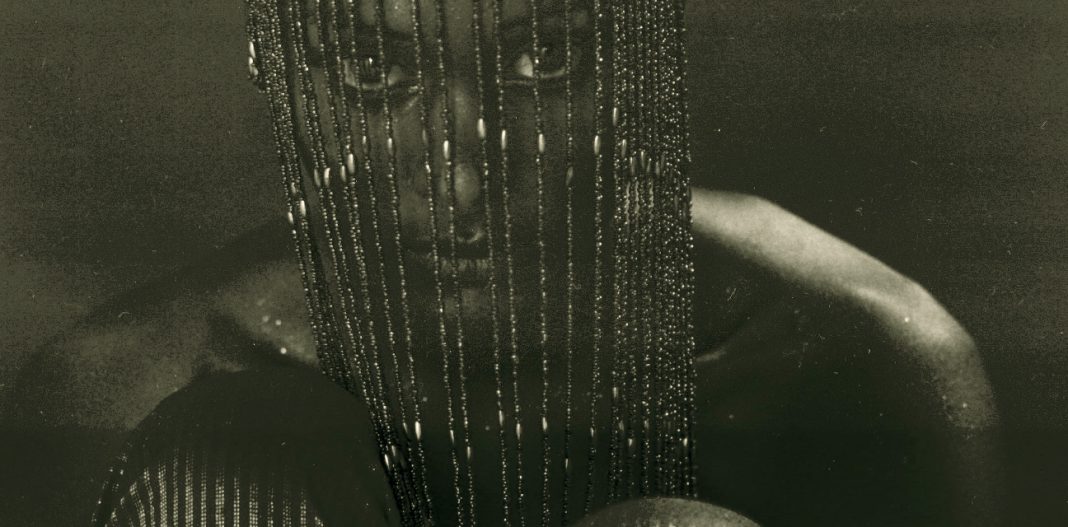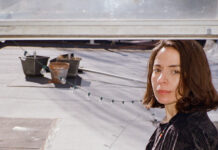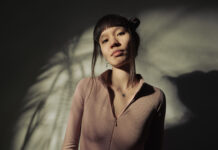Photo: Press (Perera Elsewhere)
Sasha Perera grew up on Jungle and Drum’n’Bass in London, moved to Berlin in 2000 where she started Jahcoozi with Oren Gerlitz and Robert “Robot” Koch. Sitting somewhere between club music and Pop appeal, the three-piece found their own niche within the German capitol’s vibrant scene. When Perera released her debut album Everlast through Friends Of Friends under her Perera Elsewhere moniker in 2013, it sounded nothing like the bouncy, bass-heavy tunes she’d made with Jahcoozi. Her music was now featuring acoustic guitar prominently, and it were also rather sombre. Ahead of her performance at Berlin’s Heroines Of Sound between December 08 and 10, she recorded a mix which shows yet another of her many sides. Listen to it below our interview with Perera Elsewhere!
p>
Heroines Of Sound focuses primarily on female composers and musicians who were forgotten over time, or not even fairly credited for their work when they were active. Did you have personal heroines of sound when you were growing up, or would you recommend someone whose work needs to be revisited?
I recently met Suzanne Ciani at the Ableton Loop event. What an amazing lady! I’d seen her on some old Buchla documentary footage. She’s lovely and totally inspiring to meet. Unfortunately, I actually didn’t really have so many female role models when i was growing up. Alice Coltrane or Space Lady are people I discovered way too late in my life. Micachu is someone I think is an amazing producer right now, not sure how many people realize that.
From your work with Jahcoozi to your recent solo releases, you have explored many different styles. What’s to be expected from your set at Heroines of Sound, where you will be performing with a full band?
Well, it’s pretty psychedelic and experimental but also in some ways pop because I compose songs as well as tracks. My drummer is amazing and scratches on cymbals and plays with his hands and stuff. Because I manipulate sounds in lots of ways in my productions and because of my choice of instrumentation – like recording random stuff I find around, or using samples of a recording of sheep toenails on the London Philharmonic website – I think the atmosphere of the music sucks you into a zone that’s pretty unique. It’s supposed to somehow take you away from your normal reality. I also use a leap motion movement sensor to trigger some sounds. I use a live pitch shifter to play pitched layers of live trumpet and vocals. It”s somehow more dynamic than the record, which is what is should be because it’s live! We also play other versions of tracks and some unreleased tracks.
You’ve released one album under your Perera Elsewhere moniker, 2013’s Everlast, but have already discussed working on new material. How is that coming along?
I’ve finished producing it! it took me ages! I’m just working on all the videos and design with my friend Hugo Holger Schneider right now. It’s gonna drop on the Los Angeles based label Friends of Friends Music in April. It’s great to work with them again. The new record sounds different to the first record but it’s also totally related. Sounds like I’ve been busy and have been learning lots. It’s exciting.
The mix you have recorded in anticipation for Heroines of Sound blends tunes from the Hardcore Continuum with Grime and, near the end, more experimental tunes. What was your idea behind it, how did you select the tracks?
Despite the fact I produce music that some listeners or “the internet” has branded “Doom Folk” I also happen to DJ different forms of syncopated, bass heavy, polyrhythmic music. I’ve actually been doing that for almost 10 years. For me it’s just a journey I’ve been following from Jungle to D’n’B to UK Garage, Grime, Dub, Dubstep, Dub Techno, Post-Dubstep, bla bla… It’s been going for me since the first time I went to Notting Hill Carnival in the 90s. I guess im a product of the hybrid of electronic music that made London such an exciting source and place to grow up in the 90s. Nowadays, a lot of that goes under Bass music or Fwd or even Grime, lots of which can be instrumental. For me, it’s just the syncopated club music that I play. It’s interesting that I love to DJ these kinds of tunes but it”s not the music i wanna compose. I wanna be able to compose music without actually giving a shit if people dance or not! (laughs) When I DJ, I actually like to DJ for at least 2 hours and to go on some kind of journey, so with this mix I also wanted to somehow show the journey despite it being just a one hour mix. I actually love playing the end of a party because you can get so weird music-wise and people are so open to it at that time. In terms of tracklist, I just put together some of the stuff I play when I DJ and some of the other stuff I”m into right now. K Leimer is some old classic re-release but Klein or Yves Tumor on Pan records are newer artists im really into. I’m digging the new Romare record on Black Acre records too. The Green Door Allstars is a dope collaboration record on a label called Autonomous Africa.
In 2000, you’ve moved from your hometown London to Berlin, where you’ve been residing ever since. While in these years, the club scene has increasingly become a tourist magnet and thus contributed to the city-wide gentrification, it seemingly has also become more politically conscious. How did you personally experience these developments in the past 16 years?
It was obviously super nice and cheap to live in Berlin in 2000. But cheap rent meant coal heating which was kinda depressing. Shower in the kitchen. Toilet in the floor below. Cold! Also, there was much shittier food. No vegan bla bla, just Döner kebab and a non-descript “Asia-Pfanne” with monosodium glutamate in it. You got much more stared at as a person of colour walking down the street. A guy at a club once said I was as dark as his shot of Jaegermeister! People would ask me why on earth someone would move to Berlin from a city like London. Berlin felt much less vain, especially on an international level. It was pre-internet and pre-“Poor But Sexy” Berlin marketing. It definitely felt much more covert. Having said that, there were still tons of Germans from other cities in Germany moving to the Berlin to feel some of the “new” capitol’s hipness at the time. They pushed up the prices of Mitte and Prenzlauer Berg which were also squatter and artists areas at the time. I think in every city there are dickheads and you gotta find authentic people who can inspire you and vice versa. Yes, the city is getting so expensive that I doubt I would move here if I was 20. I could only afford to move to Berlin because my rent was 300 Deutsche Mark. I could earn that in a bar in 2 or 3 shifts. Thus, I could sit around an start making music and develop creatively, not something I had even intended doing. One thing lead to another. It”s definitely gonna be much harder for everyone in the next decade in Berlin. What I love about Berlin is the fact I can ride a bike everywhere and that it”s a fairly liberal place. I live in Kreuzberg and as much as I love living there, it is actually shocking how badly integrated it is. I hope my generation can change that, but it’s really fucking hard. Somewhere like Südblock or Café Kotti are the few places which make an effort to make local communities from the housing blocks feel welcome in their premises. Essentially, I left London because it became a very expensive place to live, I hope Berlin will deal with these issues differently.
With collectives like Mint or festivals such as Reclaim The Beats as well as Heroines of Sound, a more inclusive (or third wave, if you will) approach has become more prominent. Is that, however, reflected in the city’s club scene as a whole?
I think there is a very creative scene in Berlin with very diverse music and loads of people generating lots of exciting cultural content. Unfortunately, becazse as tourism is often superficial in the way it categorizes things, many people think that Berlin is Disneyland and Techno is Mickey Mouse. A city with relatively high unemployment has kind of shaped itself according to the cliché in some ways, they maybe figure it’s the surest way to make some money. I think it will change again and that the city will succeed in being recognised as a culturally progressive hub, which is what it is. The “third wave” approach is part of being exactly that. Also, I reckon that once the world EDM trend subsidies a little, a lot of the “consumers” will just move on, leaving Berlin to continue to carve at it’s identity in multiple ways.
Stream: Perera Elsewhere – Heroines Of Sound 2016
Mix
01. FKXK1 x ENA – B1
02. Tsorna – The Green Door Allstars
03. Callahan – Got Me
04. Majora – Lint Roller
05. Bass Clef – Name Shame
06. Menchess – Mitsubishi Song
07. James Blake – 200 press
08. Champion & Four Tet – Flipside
09. Brtsh Knights – If I Was To
10. Amit – Operator ( Addison Groove RMX)
11. Capo Lee – Mud
12. Breakage – Staggered Dub (Sam Binga RMX)
13. Itoa – PAYGK
14. Itoa – B2 the B
15. Romare – Who To Love
16. Crypticz – MTD
17. Mstro – Aspirin
18. Who is Richie Brains – The Blips
19. Yves Tumor – Role in Creation
20. Chimes 7 – Micachu
21. K. Leimer – Almost Chinese
22. Klein – Hello feat. Jacob
23. Romare – Don’t Stop

Groove präsentiert: Heroines of Sound
08. bis 10. Dezember 2016
Tickets: Tageskarte 15€ (10€ reduziert)
HAU2
Stresemannstraße 29
10963 Berlin



![[REWIND 2024]: Die Szene ist der Sargnagel im Berliner Clubsterben](https://groove.de/wp-content/uploads/2024/12/clubsterben-berlin-szene-2-218x150.webp)
![[REWIND 2024]: Gibt es keine Solidarität in der Clubkultur? Header REWIND 2024 Solidaritaet](https://groove.de/wp-content/uploads/2024/12/Header-REWIND-2024-Solidaritaet-218x150.jpg)
